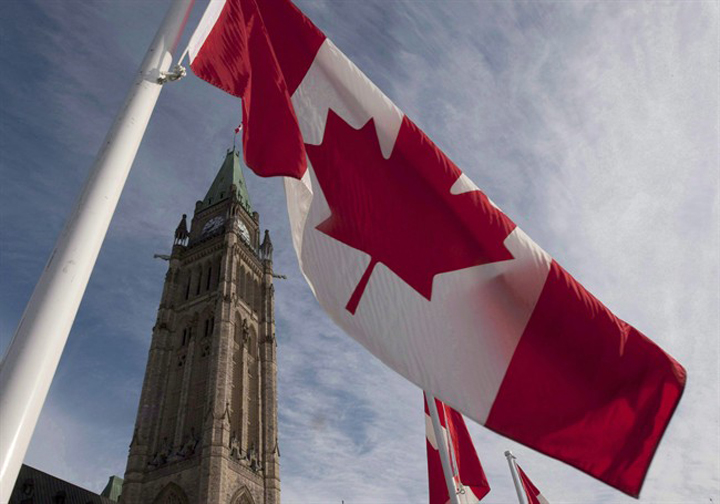OTTAWA – Strawberries aren’t the only crop being harvested around Canada Day — Conservative MPs have been collecting data for years about their constituents through a taxpayer-paid, mail-in contest focused on patriotism.

It’s just one of the novel ways federal parties are using to connect with voters and take a riding’s temperature on key issues, in an age where identifying potential supporters is a path to electoral gain.
In the Conservative case, MPs send out a full-colour flyer with a double-sided Canadian flag to post in a window. Constituents are asked to send back a postage-free reply card that includes a series of questions and a space for their name and return address.
“Please let me know that you have done this so I can include you in the count of participants,” Manitoba MP Shelly Glover wrote in her constituency report this summer.
“The riding that displays the most flags … will earn the title of ‘Most Patriotic Riding in Canada’,” she adds. Recipients are not told that the title is bestowed only on a Conservative-held riding.
The flyers were conceived by the House of Commons-funded Conservative Research Group several years ago. Each MP can modify the form to their liking.
Ontario MP Stephen Woodworth’s letter this year asks constituents to check off whether he is on the “right track when it comes to the issues that matter most to you?” The recipient is then asked to check off whether they are a senior, homeowner, parent of a child under 18, veteran or student.
- Budget 2024 failed to spark ‘political reboot’ for Liberals, polling suggests
- Train goes up in flames while rolling through London, Ont. Here’s what we know
- Peel police chief met Sri Lankan officer a court says ‘participated’ in torture
- Wrong remains sent to ‘exhausted’ Canadian family after death on Cuba vacation
Saskatchewan MP Maurice Vellacott asked in his flyer last year: “Which party represents your views on today’s most important issues?,” with boxes to check off.
The patriotism contest sometimes gets coverage in local newspapers. But not all constituents are enthusiastic.
Clare Pieuk, a Winnipeg-based blogger, has complained to Glover’s office about the flag mail-outs and their cost to taxpayers. He has dubbed the 40×30 cm unfolded pamphlet the “mother of all flyers.”
“It rubs me the wrong way that she’s saying we’re trying to promote patriotism in Canada and her riding, and yet when you look closely, she’s mining a fair bit of data. But that’s not how most people would see it,” said Pieuk.
Guy Lauzon has helped his eastern Ontario riding of Stormont-Dundas-South Glengarry win the “most patriotic” title six times, at one point getting 11,000 people to put up the flag by going door-to-door.
Lauzon says the attached questionnaire is a valuable tool for getting a handle on the needs of his constituents, and not just the ones who vote for him.
“People are pretty negative about these (flyers) but boy, that’s a wonderful way to reach thousands of people and to get their feedback,” said Lauzon. He adds that he has used collected data to help deliver services to constituents with disabilities.
But independent MP Brent Rathgeber, who left the Conservative caucus last year, said he is certain information collected is sometimes funnelled into Conservative party databases for electoral purposes. He participated in the “Proud to be Canadian” campaign in 2009 and 2010.
“In my view, it would be inappropriate to harvest that for partisan purposes because that’s harvested through taxpayer resources, but I’m not so naive to know that doesn’t happen,” said Rathgeber.
“I will tell you unequivocally on the record that people do it.”
The Conservatives are hardly alone.
All parties in the House of Commons use such mail to reach constituents, and ask similar questions.
There are no laws that cover the sharing of parliamentary information with party databases, nor does Canada’s privacy commissioner have any oversight over politicians.
The appropriateness of certain mail campaigns sent with parliamentary resources is the topic of hot debate, with the NDP facing a $1.17-million bill for mail-outs that were determined to cross the line into partisanship. The NDP is now asking the Federal Court for a judicial review of the decision by the Commons Board of Internal Economy.
The letters in question include a postage-free reply card that asks which of the federal leaders the constituent trusts, with boxes to tick beside each person’s name. The person’s name, address and email address are also requested.
A flyer sent by former interim Liberal Leader Bob Rae into New Democrat MP Craig Scott’s riding last year asked six pointed multiple choice questions on the New Democrats, and then asked “Who do you think best represents your values and priorities?”
David Coletto, chief executive officer of research firm Abacus Data, said organizations collecting data are always seeking ways to persuade people to respond — a contest such as the Conservative campaign is one such incentive. It also sends the message that the Conservatives are a patriotic party.
House of Commons-paid mail is a way to collect data that doesn’t cost parties any money, but Coletto said it isn’t necessarily the most effective way. The information would have to be layered with other research.
“It does show more evidence that the parties are very much in a marketing frame, they are doing everything they can to understand the voters,” said Coletto, who teaches political marketing at Carleton University.
“We know from other accounts the Tories have traditionally done the best at this.”



Comments